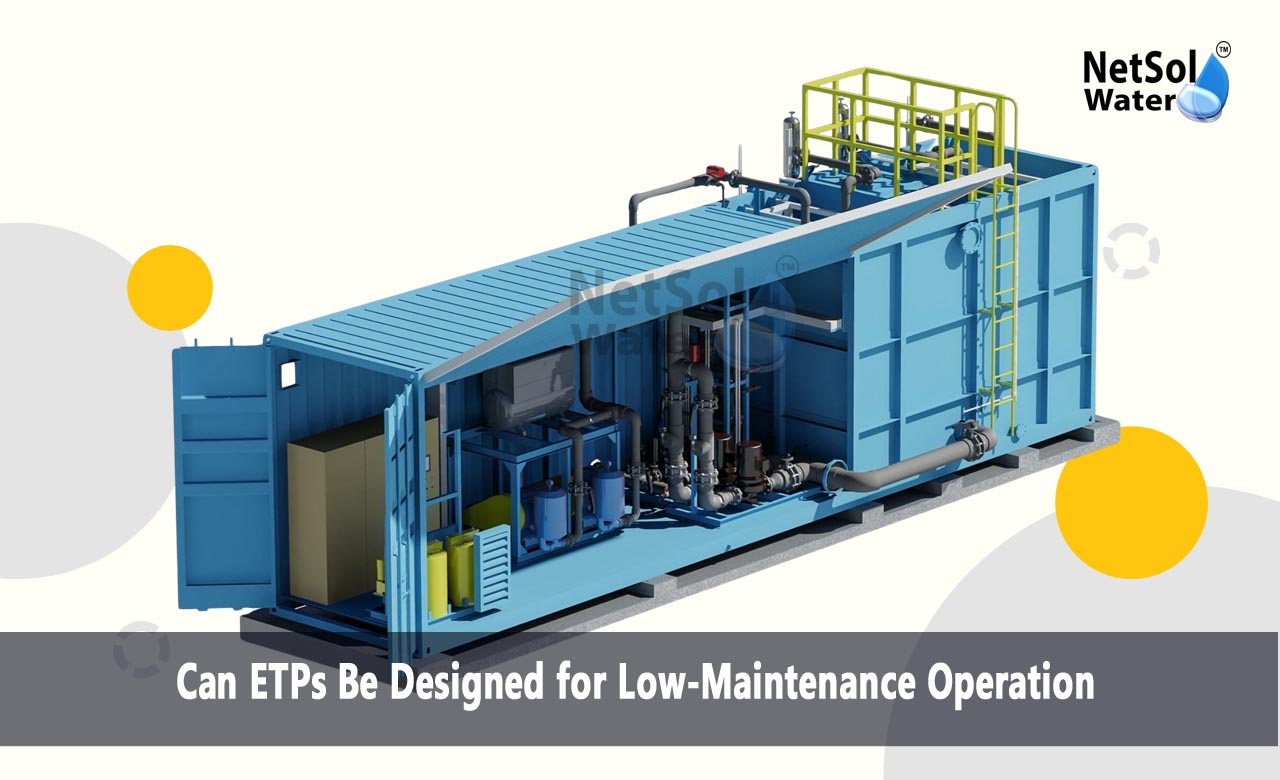Can ETPs Be Designed for Low-Maintenance Operation?
Effluent Treatment Plants are needed for industries and institutions that produce wastewater. The main purpose of these is to treat effluent to a safe level before discharge into the environment or reuse for non-potable applications. Yet, among the concerns of facility owners and operators is the amount of maintenance needed to operate these systems effectively. This has brought up a widespread and pertinent question: Can ETPs be designed for low-maintenance operation?
The short answer is yes. With proper planning, design, and technology, ETPs that can be operated with low maintenance are highly feasible—particularly for small to medium-sized systems that aim for efficiency without excessive reliance on daily manual operation.
Maintenance Issues in Conventional ETPs
Conventionally, ETPs were commonly perceived as high-maintenance systems. They demanded:
· Daily manual checks
· Replacement of components such as filters or pumps on a frequent basis
· Adjustment of chemical dosing
· Sludge treatment and disposal
· Constant monitoring of flow rates and system health
These demands not only made operations more expensive but also deterred smaller units or institutions from their installation. With the passage of time, however, advancements in design and automation have simplified it to minimize the amount of manual effort involved.
What Makes an ETP Low Maintenance?
When we refer to ETPs designed for low-maintenance operation, we imply systems that need less frequent intervention without compromising on treatment efficiency. Here's how it is achievable:
Automation of Central Operations
Automation can go a long way in minimizing maintenance. From automatic chemical dosing plants to programmable logic controllers (PLCs) for monitoring water levels, flow rates, and pH levels—automation minimizes the requirements of constant supervision.
Low-maintenance ETPs usually have real-time sensors, alarms, and control systems to notify operators only when something is beyond the acceptable limit.
Robust Equipment Utilization
Another manner in which ETPs that operate on a low-maintenance basis are effective is by utilizing robust, corrosion-resistant materials and components. Pump, pipes, tanks and high quality stainless steel or non-respective polymers have a longer lifetime and requires low replacement.
Self-cleaning membranes and long-life filters also reduce the requirement for regular manual cleaning or replacement.
Streamlined Design Plan
Small, modular ETP designs are simpler to maintain than large, complicated ones. Such plans reduce piping, decrease leak hazards, and provide better accessibility for regular checks.
Straightforward avenues, less pipeline bending, and clearly marked inspection points all make for a simpler design to comprehend and work with.
Gravity-Driven Flow Systems
In smaller designs of ETPs, gravity flow instead of pump-based systems save on mechanical wear and tear. Reduced moving parts equal less danger of breakdown, which means lower maintenance needs.
Where feasible, low-maintenance operation of ETPs depends more on passive flow designs that do not require continuous power or machine activity.
Low-Maintenance Design Key Components
· Rotating Biological Contactors (RBCs): Low-power consumption and easy to monitor. Process control is minimal.
· Submerged Aerobic Fixed Film Reactors (SAFF): These biofilm systems require less cleaning.
· Self-cleaning filters and screens: These exclude large solids without requiring manual cleaning.
· Advanced SCADA systems: For remote monitoring, data logging, and early fault detection.
By incorporating these elements, ETPs are more reliable and easier to maintain in the long term.
Advantages of Low-Maintenance ETPs
It is not merely a matter of convenience to design ETPs for low-maintenance operation. It also has several long-term benefits:
· Cost saving: Less breakdowns, reduced manpower, and minimum downtime lower operating costs.
· Improved compliance: Regular operation guarantees treated water complies with legal discharge norms.
· Longer life: Well-kept systems last longer with fewer overhauls.
· Greater uptake: Additional industries and housing societies that depend on water are inclined to fit ETPs when they learn maintenance is minimal.
Appropriate Industries and Environments
ETPs be designed for low-maintenance operation can prove to be highly beneficial in industries with consistent wastewater properties, including food processing facilities, textile mills, residential areas, and schools. Such arrangements tend to have a consistent flow and minimal lethal chemicals and are thus likely to be good candidates for easy systems.
Key Considerations
Although low maintenance is equal to "no maintenance", this means that through carefully plan and top-grade devices, plant owners can reduce daily intervention. Regular inspection, monthly service check, and periodic component replacement are still necessary to ensure that the system is safely operated.
It is also important to train operators, although their task is to inspect the alarm or clean filter only from time to time. Training prevents them from becoming careless and drives the system effectively.
Conclusion
The concept of ETPs designed for low-maintenance operation is realistic and feasible. Due to advanced design practices, automation, and robust materials, it is now possible to construct and operate ETPs with minimal daily input.
This transition is particularly essential for small industries or communal-level wastewater facilities, which do not usually have the manpower or budget for rigorous maintenance. With proper planning from the beginning, a low-maintenance ETP can provide consistent, long-term operation with lower operating costs and minimal environmental burden.
If you will be installing an ETP and are worried about long-term maintenance, be sure to discuss low-maintenance design solutions with your system vendor that meet your facility's requirements.
Do you need an advice or assistance on selecting the best water and waste water treatment unit? We have solutions for all your problems!
Let us know your problem, our experts will make sure that it goes away.
For an assistance or related query,
Call on +91-9650608473 Or write us at enquiry@netsolwater.com



